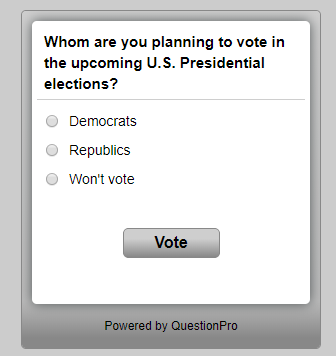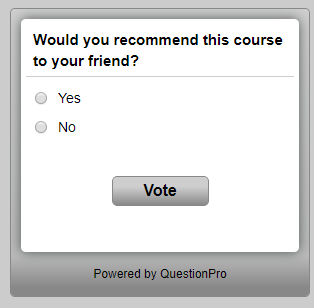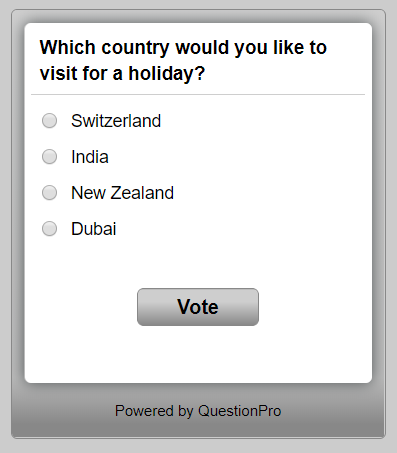What are online polls?
An online poll is a survey in which participants communicate responses via the internet, typically by completing a set of questions on a web page. The online poll creator can either keep it open for everyone to answer or for a selected group of people.
Online polls offer flexible, convenient, and time-saving options to learn about public opinion cost-effectively. QuestionPro online polls are free, easy to create, and can be made live within minutes!
Example: Voting polls were created to understand the opinion of the public and are presented to a sample of people who would be influential in generalizing the opinion of the entire section of society.
Collect a lot of data with less resources.
Creating a free poll online is really quick and one of the fastest ways to gather employee feedback and opinions. It takes only a few clicks to create a live poll. As compared to other methods of market research, polls collect a lot of data with far less resources. Furthermore, due to the lack of data entry in the chain of steps, it is less likely that any input errors and inaccuracies will creep into the poll results.
-
Get feedback instantly.
Online polls help you get on-the-spot feedback for any idea or event. So, you can make decisions that are backed by strong data. This will increase the probability of your success and strategize your future course of action.
The live polling app can also collect instant feedback at the point of experience. The data collected can be used to generate reports and analytics and improve service delivery in real time. When you create a free online poll, you convey a message that you are listening to them and that their opinions matter.
Depending on the configuration, online polls can offer instant results to the respondents. This also gives them a clear idea of how their opinion stands in comparison with the larger crowd.
-
Reach a wider audience.
Online polls, by nature, are easy to distribute and respond to, thanks to the internet. You might be a business based in CA, but with a live audience polling app, you can reach your customers based in NY or anywhere across the globe.
-
Easy to distribute & respond.
Online polls can be distributed through websites, social media, smartphones, QR codes, or email. To embed them on a website, you just need to embed a piece of code. Sharing on social media is even simpler with the online polling tool; just click a button and post your message.
Free online polls contain one question, which can be a single, multiple-choice, or open-ended question. Answering one question hardly takes a few seconds, and hence, it doesn't require the respondent to make too much effort.
-
Easy to analyze.
Most free online poll creation tools allow you to present data in the form of graphs, bar charts, pie charts, and many more. You can compare the results of different polls, perform text analysis, and create filters. This is a huge time-saver when it comes to sharing results with your team members and is, therefore, another reason why online polls are a great choice for busy professionals.
How to create an online poll using QuestionPro?
-
Log In to Your Account.
Start by logging in to your account using your poll maker, QuestionPro.
-
Navigate to the Poll Section.
On the dashboard, click the ‘Polls’ option in the left-hand corner.
-
Create a New Poll.
Click on the ‘+Create a New Poll’ button to begin the process.
Give your poll a name and click ‘Create a Poll’ to proceed.
-
Add Your Question.
In the Edit Question section, type your poll question.
Choose the answer type that suits your needs. You’ll have three options:
- Single Choice (for one answer)
- Multiple Choice (for several answers)
- Text Box (for open-ended responses)
-
Customize Answer Options.
Edit the answer options to match your poll’s requirements.
Your poll is ready to go once you're happy with the setup!
-
Share Your Poll.
You can easily share your poll by copying the link and posting it on social media platforms like Facebook, Twitter, or LinkedIn.
Alternatively, you can share it through a QR code, all with a single click.
-
Embed the Poll on Your Website.
If you want to embed the poll on your website, copy and paste the HTML code into your site’s backend.
And that’s it! You’ve successfully created and shared your poll in just a few simple steps.
How can you use free online polls?
Below are some of the common use cases of online polls to gather opinions and feedback.
-
Elections
Media companies or political parties can use free online polling tools before primary or presidential elections to get an idea of who is being more popular amongst all the candidates. With polls, one can have a fair idea of who's likely to win an election.
Example: If a media company wants to know which political party is most likely to win the U.S. Presidential elections, then they can run a free online election poll on their website and social media platforms to understand the sentiments and thoughts of their visitors.

-
Sports
A lot of people follow sports, so organizations use sports events to engage with their audience and make business decisions.
Example: During the FIFA tournament, companies like Nike and Adidas can run a poll on their websites and social media platforms like Facebook and Twitter to predict the trophy winner. Such tactics can really help businesses to engage with their customers and maintain a good relationship with them.

-
Education
Massive online open course websites, academic institutions, and universities can run a quick online poll to understand if students liked the curriculum and course in general.
Example: Udemy can run a poll for all the students who bought the course “Angular 8: The Complete Guide” and get to know if they liked the course, thereby predicting their sales.

Characteristics of good online polls
-
Right questions
Although the definition of ‘right’ is subjective, the general best practice is to avoid asking sensitive questions - questions that might hurt somebody’s sentiments or religious beliefs. Use words that convey the meaning clearly.
Phrase the poll questions so that they extract the exact information that you need and avoid the possibility of ambiguous responses. The options should also be mutually exclusive. In case you think that the respondent will not be able to select a clear answer, give them the option to express their non-decisiveness. Do not use unfamiliar acronyms and abbreviations.
Example: If you are a travel agency and want to predict which will be the most popular holiday destination for the next season, then give out options that are geographically quite different. This will help you create better engagement during online meetings, classes, and events and make better decisions.

-
Connect with the audience
A good online poll encourages the audience’s engagement. Design the look and feel of the online poll such that it’s easy to catch the attention. It should be an effortless and fun experience to respond. Good online polls ask for ideas on new initiatives like training, health and wellness programs, and more. Often, they also have their URLs customized so that they are more readable and meaningful. Such URLs prove to be user-friendly if shared as plain text via email.
Example: If the HR department of a company wants to increase employee engagement, then they can ask questions that would let them understand their choices, and employees will be happy to respond.

-
Well-targeted
Online polls should be displayed in a place where they are easily accessible, noticeable, and responsive to all devices. The best way to get more responses to your free online polls is to place them tactically on your website. Another great way to get more eyeballs is to share on social media during peak usage times.
-
Well-distributed
Another great way to get more eyeballs is to share live polls on social media during peak usage times. It is believed that sharing free online polls over such platforms increases the response rate. People spend their leisure time on social media, and hence, they wouldn’t mind answering a question that requires just a few clicks.
-
Offer incentives
One of the other ways good online polls gain the attention of the people and make them respond is by offering an incentive. Apart from keeping it free, which is an incentive in itself, you can also offer gift coupons to the first person who answers the poll question.
How to select between online polls and online surveys?
Both online polls and surveys allow you to gather opinions and feedback from the audience. They offer you insights into their thoughts and experiences. Based on the outcome of the poll, you can change your future strategy or test if you are going in the right direction. It can help you to be more confident about your performance so far. Surveys, too, help you get valuable input from your audience and help you serve them with better products and services.
But if online polls and surveys are so similar, what is the difference between polls and surveys?
-
Time
If you want to make the decision right now, online polls are the right choice. But if you can wait for all respondents to answer questions, then you should go for surveys. Online polls are likely to gather higher responses, as they take very little time to respond. Surveys may take more than a few minutes of a respondent’s time. Hence, somebody might delay answering it. In such cases, online polls make a better choice.
-
Decision
Surveys are for making decisions and getting insights. Polls, on the other hand, are used to get a sneak peek. Surveys often employ programming like branching, scoring, quotas, criteria, etc, whereas polls don’t test the logical behavior of the respondents. Also, if you want to force them to answer a few mandatory questions, it is possible through surveys, but it is not possible in the case of online polls.
Another aspect is how important a decision you want to make. If you just want to get the pulse of the situation, go for an online poll. But if you want to know the details and gather statistical data, go for online surveys.
-
Number of questions
Online polls are short, typically one question long, whereas surveys consist of many questions that are related to each other. For instance, a customer satisfaction survey consists of many questions. Had it been a poll, it would have been a simple yes/no question asking whether you are satisfied with our services. Poll questions are one-liners and ask the respondents' opinions very directly. Survey questions can be a bit longer.
-
Control over respondents
Surveys offer you the flexibility to select a specific number of respondents from a specific demographic. You can ask qualifying questions and only allow those respondents who fit the criteria to finish the survey. Online polls are presented to everybody and do not offer a mechanism to filter respondents based on specific criteria.
Create a Free Poll
Survey Software Easy to use and accessible for everyone. Design, send and analyze online surveys.
Research Suite A suite of enterprise-grade research tools for market research professionals.
Customer Experience Experiences change the world. Deliver the best with our CX management software.
Employee Experience Create the best employee experience and act on real-time data from end to end.
















